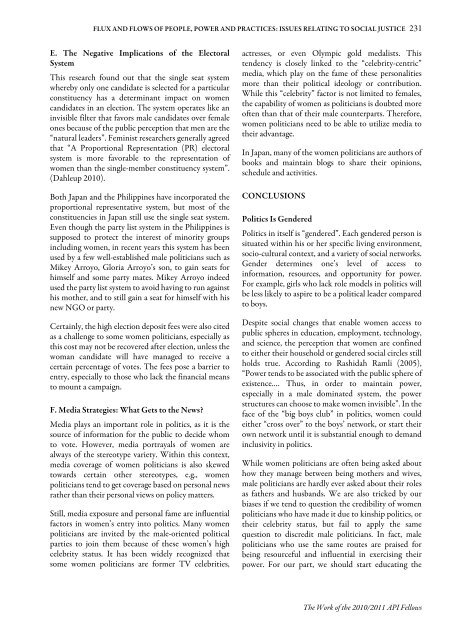Untitled - Api-fellowships.org
Untitled - Api-fellowships.org
Untitled - Api-fellowships.org
You also want an ePaper? Increase the reach of your titles
YUMPU automatically turns print PDFs into web optimized ePapers that Google loves.
FLUX AND FLOWS OF PEOPLE, POWER AND PRACTICES: ISSUES RELATING TO SOCIAL JUSTICE231E. The Negative Implications of the ElectoralSystemThis research found out that the single seat systemwhereby only one candidate is selected for a particularconstituency has a determinant impact on womencandidates in an election. The system operates like aninvisible filter that favors male candidates over femaleones because of the public perception that men are the“natural leaders”. Feminist researchers generally agreedthat “A Proportional Representation (PR) electoralsystem is more favorable to the representation ofwomen than the single-member constituency system”.(Dahleup 2010).Both Japan and the Philippines have incorporated theproportional representative system, but most of theconstituencies in Japan still use the single seat system.Even though the party list system in the Philippines issupposed to protect the interest of minority groupsincluding women, in recent years this system has beenused by a few well-established male politicians such asMikey Arroyo, Gloria Arroyo’s son, to gain seats forhimself and some party mates. Mikey Arroyo indeedused the party list system to avoid having to run againsthis mother, and to still gain a seat for himself with hisnew NGO or party.Certainly, the high election deposit fees were also citedas a challenge to some women politicians, especially asthis cost may not be recovered after election, unless thewoman candidate will have managed to receive acertain percentage of votes. The fees pose a barrier toentry, especially to those who lack the financial meansto mount a campaign.F. Media Strategies: What Gets to the News?Media plays an important role in politics, as it is thesource of information for the public to decide whomto vote. However, media portrayals of women arealways of the stereotype variety. Within this context,media coverage of women politicians is also skewedtowards certain other stereotypes, e.g., womenpoliticians tend to get coverage based on personal newsrather than their personal views on policy matters.Still, media exposure and personal fame are influentialfactors in women’s entry into politics. Many womenpoliticians are invited by the male-oriented politicalparties to join them because of these women’s highcelebrity status. It has been widely recognized thatsome women politicians are former TV celebrities,actresses, or even Olympic gold medalists. Thistendency is closely linked to the “celebrity-centric”media, which play on the fame of these personalitiesmore than their political ideology or contribution.While this “celebrity” factor is not limited to females,the capability of women as politicians is doubted moreoften than that of their male counterparts. Therefore,women politicians need to be able to utilize media totheir advantage.In Japan, many of the women politicians are authors ofbooks and maintain blogs to share their opinions,schedule and activities.CONCLUSIONSPolitics Is GenderedPolitics in itself is “gendered”. Each gendered person issituated within his or her specific living environment,socio-cultural context, and a variety of social networks.Gender determines one’s level of access toinformation, resources, and opportunity for power.For example, girls who lack role models in politics willbe less likely to aspire to be a political leader comparedto boys.Despite social changes that enable women access topublic spheres in education, employment, technology,and science, the perception that women are confinedto either their household or gendered social circles stillholds true. According to Rashidah Ramli (2005),“Power tends to be associated with the public sphere ofexistence.… Thus, in order to maintain power,especially in a male dominated system, the powerstructures can choose to make women invisible”. In theface of the “big boys club” in politics, women couldeither “cross over” to the boys’ network, or start theirown network until it is substantial enough to demandinclusivity in politics.While women politicians are often being asked abouthow they manage between being mothers and wives,male politicians are hardly ever asked about their rolesas fathers and husbands. We are also tricked by ourbiases if we tend to question the credibility of womenpoliticians who have made it due to kinship politics, ortheir celebrity status, but fail to apply the samequestion to discredit male politicians. In fact, malepoliticians who use the same routes are praised forbeing resourceful and influential in exercising theirpower. For our part, we should start educating theThe Work of the 2010/2011 API Fellows
















